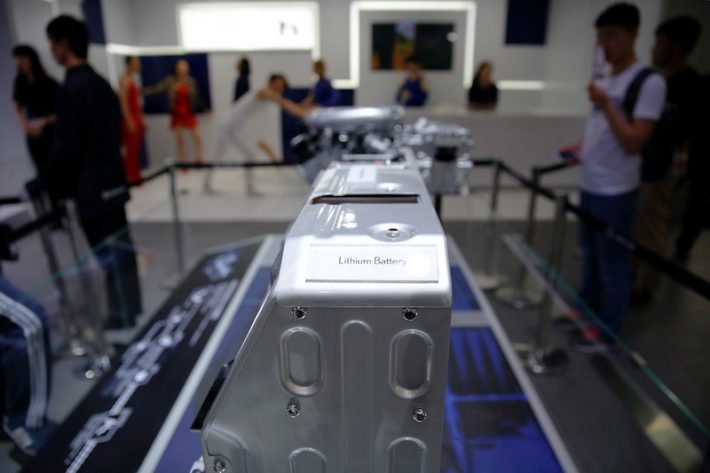Chinese firms are rushing to place orders for Nvidia’s H20 artificial intelligence processors after the company’s CEO Jensen Huang announced that the Donald Trump administration had committed to reversing the curbs it had previously imposed on the export of those chips.
China’s internet giants ByteDance and Tencent were among the firms that are in the process of submitting applications for the chips, Reuters reported, citing sources familiar with the matter.
Nvidia will need to send their applications to the US government for approval, it said.
Also on AF: Nvidia’s Huang Says China’s Military ‘Can’t Rely on US Tech’
The scramble for Nvidia’s H20 chip follows Huang’s statements that the more than $4-trillion company had won assurances from the White House that it can return to the Chinese market with the chips that are used to develop AI models.
“Today, I’m announcing that the US government has approved for us filing licences to start shipping H20s,” Huang told reporters in China, where he has been on his second visit this year.
Nvidia also said in an official statement that it was filing applications with the US government to resume sales to China of the H20 graphics processing unit (GPU), and expects to get the licences soon.
“The US government has assured Nvidia that licences will be granted, and Nvidia hopes to start deliveries soon,” the company said.
Central to the process is an approved list Nvidia has put together for Chinese companies to register for potential purchases, sources told Reuters.
Along with Nvidia, AI chipmaker AMD has also said it was informed by the US Department of Commerce that licence applications to export its MI308 chips to China will be moving forward for review.
The moves come as tensions between Washington and Beijing ease, with China relaxing controls on rare earth exports and the US relaxing its chip export curbs.
Still, this is the first time in three years that the US will walk back any of its stringent export curbs targeting AI chips. Former US President Joe Biden initiated the export control regime targeting flows of AI chips and chipmaking tools to China in 2022, saying Beijing was using the tech to modernise its military, creating a national security risk for America.
Since then, US officials have halted exports of a range of Nvidia chips to China, often within days of the firm announcing new processors designed specifically to meet export control guidelines.
Outgoing Commerce Secretary Gina Raimondo warned Nvidia at the time that if it were to design any chip that would enable China “to do AI”, she would “control it the very next day.” Raimondo also said companies like Nvidia needed to prioritise national security over profits.
Wooing Trump
Since the election of Trump, however, Huang has reportedly been looking to woo the new US president for a softer stance on chips flows to China.
In May, tech news publication The Information reported that Huang had become the “chief lobbyist for his company” and was engaging directly with Trump at his club Mar-a-Lago.
Before that, in April, US broadcaster NPR had reported that after Huang attended a Mar-a-Lago dinner, the Trump administration initially halted its plans to restrict H20 chip exports. That pause was short-lived, however, as Washington eventually imposed those curbs later in the month.
Meanwhile, the latest reversal of rules also comes days after Huang met Trump. The Nvidia chief also reportedly informed the US president that he was going to visit China — a trip that has made some US lawmakers anxious.
“He knew I was going to come here… and he told me to have a great trip,” Huang said, according to a report by state-owned China Media Group.
Huang has been a sharp critic of the chip export control regime and has previously said it was a “failure” that only prompted China to innovate and build its own semiconductor supply chain.
But, for Huang, resuming exports to China is also crucial to boost his business and his firm’s desire to continue to dominate the sector. The world’s most valuable company has said the curbs would cut its revenue by $15 billion.
Nvidia’s absence has also given an opening to its Chinese rivals, such as Huawei, to capture China’s AI chip market. Before the US tightened its export curbs, Nvidia had over 90% of that market.
“This is a major catalyst for Nvidia shares, as many had written off the chance of any meaningful revenue coming from China,” Matt Britzman, senior equity analyst at Hargreaves Lansdown told Reuters.
Shares of Nvidia and AMD jumped about 5% and 7%, respectively, in early US trading [as of 3 PM GMT]. Nvidia shares are already up nearly 19% over the past month.
AMD, which has forecast a $1.5 billion revenue hit this year due to the US export curbs, plans to resume shipments of these chips when licences are approved, it said in an emailed statement.
Wooing China
Aside from Trump, Huang is also set on wooing China, which he says is a crucial market for the chipmaker.
“The Chinese market is massive, dynamic, and highly innovative, and it’s also home to many AI researchers,” Huang told Chinese state broadcaster CCTV earlier this week.
“Therefore, it is indeed crucial for American companies to establish roots in the Chinese market.”
Huang is currently on his second trip to China, after an earlier visit in April.
He is set for a media briefing in Beijing on Wednesday when he attends a supply chain expo.
Meanwhile Chinese officials were subdued on the green light for H20 chip exports. When asked about it at a regular foreign ministry briefing in Beijing, a spokesperson said: “China is opposed to the politicisation, instrumentalisation and weaponisation of science, technology and economic and trade issues to maliciously blockade and suppress China.”
Nvidia CEO Jensen Huang, in Beijing today, hailed China’s AI surge as “huge, dynamic” pic.twitter.com/jaBIKR4u0h
— China Xinhua News (@XHNews) July 15, 2025
Chinese firms desperate
Despite the rise of Huawei — which now claims its chips can rival some Nvidia offerings — Chinese companies, including big tech firms, still crave Nvidia chips for its computing platform known as CUDA.
The platform allows global developers to develop and collaborate on AI models, frameworks and apps optimised to run on Nvidia hardware, making way faster performance gains.
Another key issue is China’s restricted access to high-tech chipmaking tools necessary to make advanced AI chips. For Huawei — China’s only chip designer capable of rivalling Huawei to some extent — those challenges have meant slow supply and limited computing power.
As of last year, for instance, ByteDance had not received its chip orders from Huawei in full and the processors it did receive were not advanced enough for its existing AI model Doubao.
The circumstances mean that if Nvidia does get its promised licenses from White House, it could rake in an additional $15 billion to $20 billion in revenue this year. How those numbers eventually look would depend on when the approval is granted and how quick the deliveries can ramp back up, said Hargreaves’ Britzman.
Britzman also said Nvidia could also reverse some, or all, of the $5.5 billion in inventories it wrote-off following the H20 ban in April. It could provide “a double boost for earnings,” he said.
Still, Nvidia might not necessarily claw back its lost grip on the Chinese market, considering Beijing has gone all out to establish a self-sufficient chip supply chain and its relations with the US are still not on solid-footing.
“The uncertainties between the US and China remain high,” He Hui, research director of semiconductors at Omdia told Reuters.
“Chinese companies will continue to diversify their options to better protect their supply chain integrity.”
- Reuters, with additional editing and inputs from Vishakha Saxena
Also read:
China Science Vs US Export Controls
Nvidia ‘Plans Low-Cost Blackwell AI Chip For China’ After US Curbs
China Tech Giants ‘Ordered $16 Billion of New Nvidia Chips’
Server Fraud Case in Singapore May be Linked to AI Chips, China
Satellite Images Show Huawei’s Expanding Chip Facilities – FT
China’s Huawei ‘Hoping Its New AI Chip Can Outpower Nvidia’
China to Be Top Buyer of Chip Tools Despite Steep Cut in Spending
China’s Chipmaking Skills 10-15 Years Behind West: ASML CEO
China’s Huawei, SMIC ‘to Ramp Up Production’ of Newest AI Chip
Huawei, SMIC Set to Defy US Sanctions With 5nm Chips: FT
Huawei’s China-Made 7nm Chip ‘Years Behind US’, Raimondo Says
China Threatens to Cut Off ASML Over New US Chip Curbs
Climate Chaos ‘Could Disrupt Half of Global Chipmaking by 2050’
























